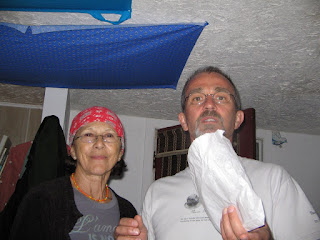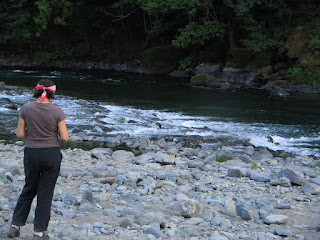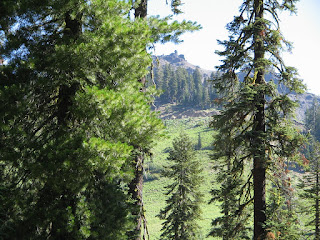for Professor John Marks
Second Assignment
for LIS 5411
PRIVACY’s POWER
I was born in Buffalo, New York to a seventeen-year-old second-generation Polish-American mother and eighteen-year-old second-generation Italian-American father. I was raised in an extended family. We were always at the edge of poverty. We suffered setbacks, but we got by. Obviously my parents needed help, and I thought money was the issue. But after contemplating privacy, reading article after article, I see privacy was and has been the fulcrum upon which my family’s happiness balanced. Joan Didion said, “The secret point of money and power in America is neither the things that money can buy nor power for power’s sake … but absolute personal freedom, mobility, privacy.” Our extended family generously helped, but our lives were an open book. In private my parents fought each other and in public they fought the “presumptuous inquires about our lifestyle and expenditures.” My European grandparents were a comfort, but also an obstacle to my parent’s pursuit of this American Dream of independence and freedom. And I never really figured it out until now.
Let’s try it again.
My wife was born in Nazi occupied Paris, France to Jewish-North African parents. She is one of nine children. Because of severe poverty, eight children (my wife included) were removed from their home by a Jewish organization and placed in four different orphanages. Alice Foote MacDougall said, “Poverty is relative, and the lack of food and the necessities of life is not necessarily a hardship. Spiritual and social ostracism, the invasion of your privacy, are what constitute the pain of poverty.” Later, my wife married an American man from a wealthy family. She was ostracized. She divorced. The wealthy family told her to get food stamps unless she did as they directed. She chose independence and privacy to dependence and humiliation. Daniel J. Solove said, “Privacy is an inherent human right, and a requirement for maintaining the human condition with dignity and respect.”
What started as research on privacy has turned into something very personal, and that is privacy’s nature. Each of us is responsible for our own privacy. Dependency leads to loss of privacy like E=mc2. I’ve learned this lesson at work also. Some high school student hacked the system and we teachers were warned, but my privacy was invaded, not because of the hacker, but because I am dependent on Broward County Schools and I was compelled to provide my personal information. Once the information is out, it’s like toothpaste. In the Agrarian Age we traded our food. In the Industrial Age we traded our things. In the Information Age we trade our information, personal or otherwise.
CONCLUSIONs: I give the history of civilization and my family as premise to the following advice and conclusions. In every information transaction, make sure it benefits you and your family. Always ask, “How does this information transaction lead us toward independency?” The opposite of privacy is dependence.
What else besides dependency robs us of our privacy? Considering credit cards, and the Internet, my wife and I now know we trade convenience for privacy. Several years ago, American Express sent my first annual summary. Then, I thought how efficient my meager budgeting could become. Now I realize, “Do I want the world to know about my meager budget? What if Ross shoppers are targeted for a home phone campaign?” And recently we bought a Sun Pass for its discount and convenience. “You know someone knows everywhere we go,” I kidded my wife on our recent trip to Gainesville. She shrugged, but she thinks this is a worthwhile trade. Because of LIS 5411 and privacy conversations, my family has decided not to give away our information for store discounts and we will never give our phone number to clerks.
CONCLUSIONs: Information is currency. Privacy is power. We can’t have our cake and eat it too.
My family is certain privacy is lost through dependency, greed and sloth. Either governments or corporations or landlords or employers…the Information Age has us by the short ones because we’re poor, or we’ll sell our soul for fifty cents, or we just don’t want to leave the house. As a matter of fact, Americans “Faced with the choice of some immediate benefit … and some uncertain privacy consequence, consumers pick immediate gratification almost every time.” (http://www.msnbc.msn.com/id/15221100/)
Privacy is the soul of our civil liberties. As Justice Louis Brandeis explained (1928), “The right to be left alone – the most comprehensive of rights, and the right most valued by a free people.” (http://epic.org/privacy/) But that was pre-Information Age. Now, Americans (60%) think their privacy is “slipping away, and that bothers (them).” But, “Seven percent, according to a recent survey by Ponemon Institute – change any behavior in an effort to preserve their privacy.” (http://www.msnbc.msn.com/id/15221095/) My family knows the importance of privacy. We refuse to let go.
SEED of SOLUTION: Simultaneously become private and transparent.
We think the solution is somewhere in the story of PGP (Pretty Good Privacy - http://www.fileformat.info/mirror/egff/glossary.htm) As PGP’s beauty rests on the simple mystery of prime numbers, so inscrutably we must unplan and plan our lives. We must irregularly perform the unpredictable. As PGP’s function is to protect, so must we secure our personal information at every moment, knowing well that even our best efforts may fail. We’ve changed our minds on the “nothing to hide” argument because of Bruce Schneier, “The truth is that we all do have something to hide, not because it's criminal or even shameful, but simply because it's private. We carefully calibrate what we reveal about ourselves to others.” (http://www.schneier.com/blog/archives/2006/07/annual_report_f.html) And again, “Psychologists tell us boundaries are healthy, that it’s important to reveal yourself to friends, family and lovers in stages, at appropriate times.” (http://www.msnbc.msn.com/id/15221095/)
Which brings us to calculating transparency. If we wish to be taken seriously we must use the Internet to expose ourselves professionally and as a benefit to society. This is the final step to securing our privacy. We will reveal to the world that we are not dependent. We contribute. We are strong in our beliefs, interests and abilities. We will expose ourselves to audit on our own terms. Like PGP, we will secure privacy by publicly demanding it as our most comprehensive and most valued right.
Privacy to the people.
I found the following story on the NPR iPhone App:
click on: Big Brother Is In Your Pocket (But You Get A Discount)
by Avie Schneider
NPR - December 7, 2012
by Avie Schneider
NPR - December 7, 2012









 O
O














